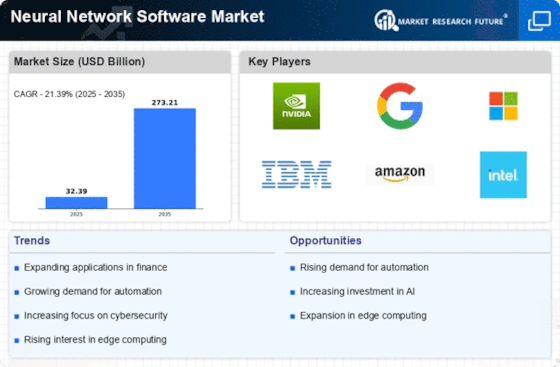Top Industry Leaders in the Neural Network Software Market

Competitive Landscape of Neural Network Software Market:
The Neural Network Software Market has witnessed significant growth in recent years, driven by the increasing demand for artificial intelligence (AI) solutions across various industries. As businesses embrace digital transformation, the adoption of neural network software becomes crucial for leveraging machine learning capabilities. The market is characterized by the presence of several key players, each employing distinct strategies to gain a competitive edge.
Key Players:
- Oracle Corporation
- Qualcomm Technologies
- SAP SE
- IBM Corporation
- Microsoft Corporation
- Intel Corporation
- Alyuda Research LLC
- Neural Technologies Ltd.
- Starmind International AG
- Neuralware
- Ward Systems Group Inc.
Strategies Adopted:
- Open Source Initiatives: Several key players, including Google and Microsoft, have embraced open-source initiatives. By providing access to frameworks and tools like TensorFlow and PyTorch, these companies encourage collaboration and foster a broader developer community.
- Integration with Cloud Services: Many companies are integrating their neural network software with cloud services. This approach facilitates seamless deployment, scalability, and accessibility, catering to the evolving needs of businesses adopting cloud-based solutions.
- Focus on Industry-Specific Solutions: To address the unique requirements of various industries, key players are developing industry-specific solutions. This strategy allows companies to provide tailored neural network software for applications in healthcare, finance, manufacturing, and other sectors.
- Partnerships and Collaborations: Collaboration is a prevalent strategy, with companies forming strategic partnerships to enhance their offerings. Collaborative efforts aim to combine expertise in AI research, software development, and domain knowledge to create more advanced and specialized solutions.
Factors for Market Share Analysis:
- Innovation and Product Development: Companies investing in continuous innovation and the development of advanced features for their neural network software tend to capture a larger market share. Regular updates and improvements keep their solutions competitive and relevant.
- Global Presence and Customer Base: The market share analysis considers the global reach of companies and the size of their customer base. Key players with a widespread presence and a diverse clientele often enjoy a larger share in the neural network software market.
- Performance and Scalability: The performance and scalability of neural network software are critical factors. Solutions that can handle large datasets, provide faster processing speeds, and scale efficiently are preferred by enterprises, contributing to higher market share.
- Customer Satisfaction and Support: Companies focusing on customer satisfaction and providing excellent support services tend to retain and attract more clients. Positive customer experiences contribute to the reputation and market share of neural network software providers.
New and Emerging Companies:
- Cognilytica: Specializing in AI and machine learning research, Cognilytica is an emerging player offering consulting services and customized solutions. The company focuses on addressing specific industry challenges through its neural network software.
- Deep Instinct: Deep Instinct focuses on cybersecurity solutions powered by deep learning. As an emerging player, the company aims to disrupt the market by providing advanced threat detection and prevention using neural network technology.
- Seldon Technologies: Seldon Technologies specializes in open-source machine learning deployment. The company offers solutions for deploying and managing machine learning models at scale, catering to the needs of businesses in various sectors.
Current Company Investment Trends:
- Hardware Acceleration: Companies are increasingly investing in hardware acceleration solutions to optimize the performance of neural network software. This trend is driven by the growing demand for efficient processing of complex AI models.
- Edge Computing: With the rise of edge computing, companies are investing in developing neural network software that can run efficiently on edge devices. This allows for real-time processing and decision-making at the source of data generation.
- Explainable AI (XAI): Investment trends indicate a focus on developing neural network software with explainable AI capabilities. Ensuring transparency and interpretability of AI models is becoming a priority for companies, especially in regulated industries.
- AI Model Lifecycle Management: Companies are investing in solutions that streamline the entire lifecycle of AI models. This includes tools for model development, training, deployment, monitoring, and maintenance, aiming for a more cohesive and efficient workflow.
Latest Company Updates:
December 12, 2023: NVIDIA announces cuDNN 8.4, a new version of its deep learning library optimized for its latest GPUs. This update promises significant performance improvements for training and running neural networks.
December 15, 2023: Google AI unveils Pathways System 2.0, a next-generation language model architecture built on neural networks. This system boasts improved efficiency and can be used for various tasks, including text generation, translation, and question answering.
January 5, 2024: OpenAI releases ChatGPT 4, a new version of its popular generative pre-trained transformer model. This model demonstrates better reasoning abilities and can engage in more factual and informative conversations.
Oct 26, 2023: NVIDIA announces the launch of NeMo 1.0, an open-source toolkit for building conversational AI applications with neural networks. Retail: Retailers are adopting neural networks for product recommendations, customer segmentation, and dynamic pricing strategies.
Nov 14, 2023: Google AI acquires DeepMind Technologies, a leading AI research lab known for its work in reinforcement learning and AlphaGo. Finance: Banks and financial institutions are utilizing neural networks for fraud detection, risk management, and personalized financial services.
Dec 5, 2023: Microsoft partners with OpenAI to develop and commercialize large language models for various applications. Healthcare: AI-powered neural networks are being used for medical image analysis, drug discovery, and personalized medicine.










